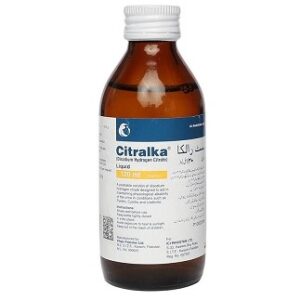Citralka Syrup is a medication used for the treatment of kidney stones. It is mostly given to kidney patients to reduce the amount of uric acid in kidney and neutralize the acid present in the body. It helps to reduce the production of uric acid, which reduces the acidity of our urine.
Gout and kidney stones are both treated with citralka liquid. Limiting the body’s ability to produce uric acid reduces gout attacks and prevents kidney stones. You can use Citralka Liquid with or without food. This will prevent you from experiencing stomach pain. Even if you feel better, continue taking it until your doctor advises it is safe. Then, take it daily.

Uses of Citralka Syrup:
The followings are some applications of citralka liquid:
In the kidney stones:
This drug is used to treat kidney stones brought on by calcium oxalate or uric acid. In individuals with renal tubular acidosis, a condition in which the kidneys fail to eliminate acids from the urine, it is also used to dissolve kidney stones.
Urinary tract infection:
This drug makes the urine more alkaline, reducing the discomfort from urinary tract infections and preventing bacterial development.
Urine’s alkalinization:
By making the urine more alkaline, this drug helps the kidneys excrete hazardous compounds from the body more quickly.
Micturition:
This drug helps to ease uncomfortable or challenging urinating.
Composition of citralka syrup:
Disodium hydrogen citrate, an ingredient in Citralka Liquid 100 ml, metabolizes to bicarbonate and boosts the excretion of free bicarbonate ions, increasing the solubility of cysteine in urine and ionizing uric acid to a soluble urate ion.
Citralka Side Effects:
The followings are the side effects of using citralka syrup:
- Diarrhea
- Nausea
- Vomiting
- Tiredness
- Weakness
- Drowsiness
- Urge to urinate frequently
- Unappealing flavour
- stomach pain
- Flatulence
- A swing in mood
How to take it?
Use this medication as your doctor directs, in the dosage and for the specified duration. Please read the directions on the label of this medication before taking it. After measuring it with a measuring cup, take it orally. Make sure to shake it well before using it. It is preferable to take Citralka Liquid at the same time each day, whether with a meal or without.
The following table will help you to take this medicine:
| Age | Dose |
| For adults (above 18) years | 10-30 ml daily |
| For children (below 17) years | Citralka is not recommended for children |
Precautions:
This medication should only be used with extreme caution in patients with gastrointestinal issues due to the possibility of the patient’s condition getting worse. Depending on the clinical condition, your doctor may advise close monitoring of the clinical condition, necessary dose modifications, or replacement with a suitable alternative.
Due to the potential for the patient’s condition to deteriorate, this medicine should be used cautiously in those with hepatic impairment. As a result, it’s essential to check your liver function while taking this medication regularly. Sometimes adjusting the dosage or replacing the medication with a suitable alternative may be essential.
This medicine should be taken with extreme caution when treating individuals with acute dehydration because of the possibility of major side effects. Depending on the clinical state, the doctor may decide that close observation of the clinical condition, appropriate dose modifications, or substitution with a suitable substitute are necessary.
Pregnant women shouldn’t take this drug unless it is required. Talk to your doctor before taking this drug. Likewise, unless necessary, breastfeeding moms should not use this drug. If you plan to breastfeed, talk to your doctor.
Overdose:
See a doctor immediately if someone has taken this medication excessively and is experiencing serious side effects, like breathing difficulties. Never exceed the dosage that your doctor has prescribed.
Untaken Dose:
If you accidentally miss a dose or forget to take one, take it as soon as you remember. Skip the missed dose if it is already time for the subsequent dose. Take your subsequent medication at the scheduled time. Don’t increase the dosage.
Storage:
Direct exposure to heat, air, or light should be avoided because it could harm your medications. There may be negative or serious side effects from exposure to a medication. The medication needs to be kept secure and out of the reach of kids.
Interactions:
The liquid form of citralka can potentially interact negatively with a wide range of other drugs. Therefore, you should tell your doctor about your existing drugs, including any herbs and supplements, before starting therapy with this medication.
Every medicine interacts with a person differently. Therefore, you should review all possible interactions with your doctor before beginning any medicine dosage.
FAQs:
- Can we use citralka syrup for urine infection?
- What is the composition of citralka syrup?
- Can we use citralka syrup in pregnancy?
- What are the side effects of citralka syrup?
- Can we use citralka syrup for kidney stones?
- Can we use citralka syrup for children?
- What are the recommended doses of citralka syrup?
- What is citralka used for?
- Does Citralka cure urine infection?
Disclaimer!
Mediebook does not provide medical advice, treatment, or diagnoses. The information provided here is for informational purposes only, and it should not be regarded as a substitution for the advice of a qualified doctor or physician.